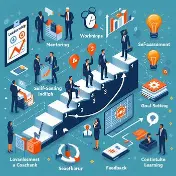Increasing staff loyalty through coaching
Employee loyalty is a key factor in ensuring the long-term success of companies. Loyalty is not just about the commitment of employees, but also about their willingness to make efforts to achieve the company's goals and their desire to stay with the company for the long term. A coaching as an effective tool, which can help increase staff loyalty. In this blog article, we will look at how coaching can be used to increase employee loyalty and what specific methods can be used to achieve this.

Why is staff loyalty important?
Employee loyalty has many benefits for the company. Engaged and loyal employees:
- Higher Performance Stretched: Engaged employees are more motivated and willing to work harder to make the company a success.
- Reducing Staff Turnover: Loyal employees are less likely to leave the company, which reduces recruitment and training costs.
- Improving Workplace Morale: Engaged team members have a positive impact on the workplace climate and contribute to a supportive, collaborative culture.
- They contribute to Innovation: Loyal employees are more willing to share their ideas and suggestions, which encourages innovation and continuous improvement.
- They Build Better Customer Relationships: Engaged employees care more about customers, which improves the customer experience and increases customer loyalty.
How can coaching help to increase loyalty?
A coaching can contribute to increasing staff loyalty in a number of ways. Here's how:
- Personal and Professional Development: Coaching gives employees the opportunity to develop their skills and competences. This increases their self-confidence and job satisfaction, which in turn builds loyalty.
- Objective and Motivation: A coach can help employees set clear goals and plan the path to achieving them. Achieving goals motivates employees and increases their commitment.
- Better Communication and Relations: Coaching helps employees to develop their communication skills, which improves team relations and cooperation with managers. Good workplace relationships foster loyalty.
- Conflict Management Skills: A coach can help staff learn how to manage conflict effectively. Managing conflict properly reduces workplace stress and increases employee satisfaction.
- Self-awareness and self-reflection: Coaching gives employees the opportunity to get to know themselves and their behavioural patterns better. Self-awareness increases employees' confidence and satisfaction, which contributes to their loyalty.
Concrete coaching methods to increase loyalty
There are a number of specific coaching methods that can help increase employee loyalty. Below are some of them:
- Individual Coaching: In individual coaching, the coach works with the employee on a personalised basis. This method allows personal needs and goals to be taken into account and can lead to deeper, more lasting changes.
- Group Coaching: In group coaching, the coach works with several people at the same time. This method helps to build team spirit and cooperation, and provides an opportunity for sharing experiences between members.
- 360 Degree Feedback: 360-degree feedback gives the employee feedback from colleagues, managers and subordinates. This method helps to develop self-awareness and identify areas for improvement.
- Mentoring programmes: Mentoring programmes involve more experienced staff helping younger or newer employees. Mentoring helps to transfer knowledge and experience, and strengthens workplace relationships.
- Skill Development Workshops: These workshops focus on developing specific skills, such as communication, time management or conflict resolution. Developing skills increases staff confidence and satisfaction.
The impact of coaching on corporate culture

Coaching not only increases employee loyalty, it also has a positive impact on company culture. Here's how:
- Supportive and Developing Environment: Coaching helps to create a supportive and supportive working environment. Employees feel that the company cares about them and values their development.
- Open Communication: Coaching improves communication in the workplace, which contributes to a more open and transparent corporate culture. Employees are more willing to share ideas and suggestions.
- Commitment and Motivation: Coaching increases employee engagement and motivation, which contributes directly to the success of the company. Engaged employees are more likely to do their best to achieve the company's goals.
- Development Opportunities: A coaching to ensure continuous development opportunities for staff. This increases satisfaction and loyalty because employees see that the company is counting on them for the long term.
- Innováció és Kreativitás: A supportive environment and open communication foster innovation and creativity. Employees are more willing to share ideas, which leads to new solutions and better results.
Case study: loyalty enhanced by coaching
Take the example of a medium-sized technology company that had serious turnover problems. The company management decided to introduce a comprehensive a coaching programme to increase staff loyalty in order. As part of the programme, individual and group coaching sessions were held and various skill development workshops were organised.
At the end of the first year, the company experienced the following results:
- Decreasing fluctuation: Staff turnover decreased by 20% as employees became more satisfied and less likely to look for other job opportunities.
- Growing Performance: Staff performance has improved significantly, which has also been reflected in the company's results. Annual revenue increased by 15%.
- Better Team Morale: The working atmosphere has become more positive, cooperation between teams has improved and staff satisfaction has increased.
- Innovative Solutions: The number of innovations has increased as staff have been more willing to share their ideas and suggestions. More successful projects were launched, contributing to the company's competitiveness.
- Commitment and Motivation: Engagement surveys have shown that employees have become more motivated and engaged, which has ensured the long-term success of the company.
So:
Employee loyalty is an essential factor in ensuring the long-term success of a company. Coaching is a powerful tool that can help increase employee loyalty by improving personal and professional skills, increasing self-confidence and satisfaction, and improving workplace relationships and communication. Specific coaching methods such as individual and group coaching, 360-degree feedback, mentoring programmes and skill development workshops can all contribute to increasing loyalty. The positive impact of coaching is not only reflected in the loyalty of employees, but also in the development of the company culture. Engaged, loyal employees perform better, reduce turnover, improve workplace morale, contribute to innovation and build better customer relationships. Case studies also show that coaching is an effective tool to increase loyalty and ensure the long-term success of the company.
Frequently asked questions
Why is staff loyalty important?
Employee loyalty boosts performance, reduces turnover, improves morale, fosters innovation and builds better customer relationships.
How can coaching help to increase loyalty?
A coaching to help personal and professional development, goals and motivation, better communication and relationships, conflict management, self-awareness and self-reflection.
What specific coaching methods exist?
Individual coaching, group coaching, 360 degree feedback, mentoring programmes and skill development workshops.
What is individual coaching?
In individual coaching, the coach works with the employee on a personalised basis, taking into account their personal needs and goals.
What is 360 degree feedback?
The 360-degree feedback process also provides the employee with feedback from colleagues, managers and subordinates, helping to identify areas for self-awareness and improvement.
How does coaching improve workplace relationships?
Coaching helps to develop communication skills, which improves relationships within the team and cooperation with managers.
What impact does coaching have on corporate culture?
Coaching helps to create a supportive and developmental work environment, improves communication, increases engagement and motivation, and fosters innovation and creativity.
What is the difference between individual and group coaching?
Individual coaching works on a one-to-one basis with one employee, while group coaching works with several employees at the same time, fostering team spirit and cooperation.
What are the benefits of mentoring schemes?
Mentoring schemes help transfer knowledge and experience, strengthen workplace relationships and support the development of younger or newer employees.
How can coaching help in conflict resolution?
The coach helps employees learn effective conflict management techniques, reducing workplace tension and increasing employee satisfaction.













